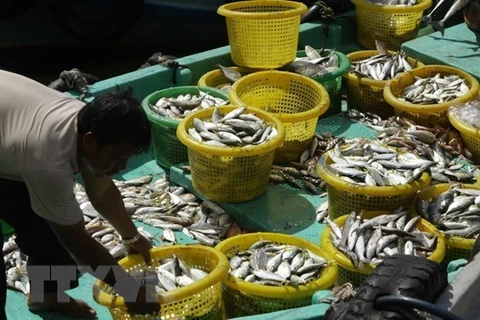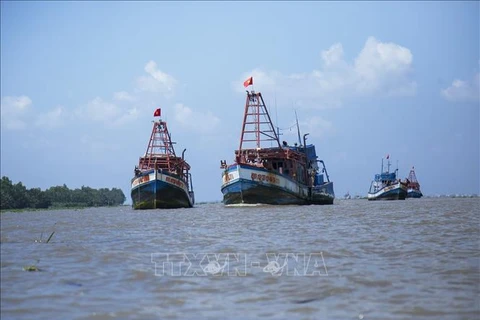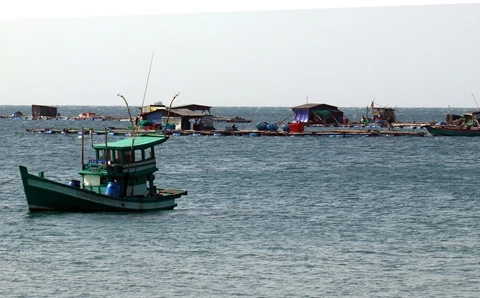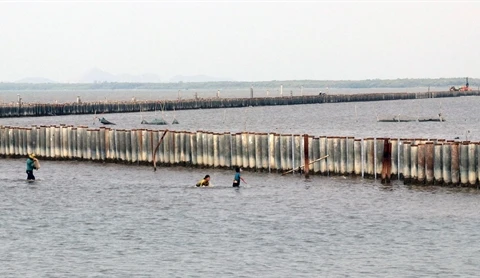HCM City (VNS/VNA) - Developing new-style rural areas has improved infrastructure and the lives of people in the Mekong Delta.
On average, the delta’s communes met 16.9 of the 19 criteria set under the national programme to build new-style rural areas at the end of last year, according to the Ministry of Agriculture and Rural Development.
The criteria cover infrastructure, transport, irrigation, electricity, the environment, income, education, healthcare, social security, and culture.
Also at the end of last year the delta had 70 percent of its communes meeting all criteria, the ministry said.
In Can Tho City and Bac Lieu province, all are new-style rural communes.
As part of the programme, more infrastructure facilities, especially roads and irrigation works, have been built to boost agriculture and improve the lives of people.
The delta has also built 92,000km of irrigation canals, embankments, water supply works, fishing ports, and storm shelters for fishing boats under the programme.
Ca Mau province has a dense river and canal network but poor road system when it embarked on the programme, and has built nearly 3,800km of rural roads, with all 82 communes now having roads.
In Soc Trang province, the implementation of effective production models has helped the Khmer minority people improve their lives.
In its Vinh Chau town, where more than 53 percent of the population are Khmer, irrigation covers 80 percent of farmlands. All communes have access to the national electricity grid and have excellent cultural, educational and healthcare facilities.
Son Ngoc Thach, deputy chairman of the town People’s Committee, said: “The lives of people in especially difficult communes and hamlets have been improved and stabilised.”
In Kien Giang, Le Huu Toan, deputy director of the Department of Agriculture and Rural Development, said the province has developed various effective shrimp farming models like semi - intensive and intensive, shrimp – rice and marine aquaculture.
Danh Tam, a farmer in Go Quao district, said the programme has improved people’s lives in recent years.
Road, electricity, school, healthcare, cultural, market, water supply, and other infrastructure facilities have been built, he said.
“The Government has enabled farmers to participate in agricultural co-operatives for large-scale production.”
Last year the delta topped the country in producing rice, brackish water shrimp, tra fish, and fruits.
But it faces difficulties such as the impacts of climate change, small scale of agricultural production and lack of co-operation among agricultural stakeholders, according to the ministry.
Besides new-style rural areas, the delta has also developed a number of products under the country’s “one commune – one product” (OCOP) programme to increase their value and incomes for rural people.
OCOP includes commercial products and services, including food and beverages, handicrafts and rural tourism services. The delta has developed products based on its strengths such as rice, fruits, seafood, and eco-tourism.
The delta has nearly 700 OCOP products now, or 17.3 percent of the country’s total, with Dong Thap, Soc Trang and Ben Tre provinces having the highest numbers.
Huynh Quang Duc, director of the Ben Tre Agriculture Extension Centre, said the products are part of effective models and should be strengthened and expanded.
They are promoting Ben Tre province’s strengths, he added./.
On average, the delta’s communes met 16.9 of the 19 criteria set under the national programme to build new-style rural areas at the end of last year, according to the Ministry of Agriculture and Rural Development.
The criteria cover infrastructure, transport, irrigation, electricity, the environment, income, education, healthcare, social security, and culture.
Also at the end of last year the delta had 70 percent of its communes meeting all criteria, the ministry said.
In Can Tho City and Bac Lieu province, all are new-style rural communes.
As part of the programme, more infrastructure facilities, especially roads and irrigation works, have been built to boost agriculture and improve the lives of people.
The delta has also built 92,000km of irrigation canals, embankments, water supply works, fishing ports, and storm shelters for fishing boats under the programme.
Ca Mau province has a dense river and canal network but poor road system when it embarked on the programme, and has built nearly 3,800km of rural roads, with all 82 communes now having roads.
In Soc Trang province, the implementation of effective production models has helped the Khmer minority people improve their lives.
In its Vinh Chau town, where more than 53 percent of the population are Khmer, irrigation covers 80 percent of farmlands. All communes have access to the national electricity grid and have excellent cultural, educational and healthcare facilities.
Son Ngoc Thach, deputy chairman of the town People’s Committee, said: “The lives of people in especially difficult communes and hamlets have been improved and stabilised.”
In Kien Giang, Le Huu Toan, deputy director of the Department of Agriculture and Rural Development, said the province has developed various effective shrimp farming models like semi - intensive and intensive, shrimp – rice and marine aquaculture.
Danh Tam, a farmer in Go Quao district, said the programme has improved people’s lives in recent years.
Road, electricity, school, healthcare, cultural, market, water supply, and other infrastructure facilities have been built, he said.
“The Government has enabled farmers to participate in agricultural co-operatives for large-scale production.”
Last year the delta topped the country in producing rice, brackish water shrimp, tra fish, and fruits.
But it faces difficulties such as the impacts of climate change, small scale of agricultural production and lack of co-operation among agricultural stakeholders, according to the ministry.
Besides new-style rural areas, the delta has also developed a number of products under the country’s “one commune – one product” (OCOP) programme to increase their value and incomes for rural people.
OCOP includes commercial products and services, including food and beverages, handicrafts and rural tourism services. The delta has developed products based on its strengths such as rice, fruits, seafood, and eco-tourism.
The delta has nearly 700 OCOP products now, or 17.3 percent of the country’s total, with Dong Thap, Soc Trang and Ben Tre provinces having the highest numbers.
Huynh Quang Duc, director of the Ben Tre Agriculture Extension Centre, said the products are part of effective models and should be strengthened and expanded.
They are promoting Ben Tre province’s strengths, he added./.
VNA
























